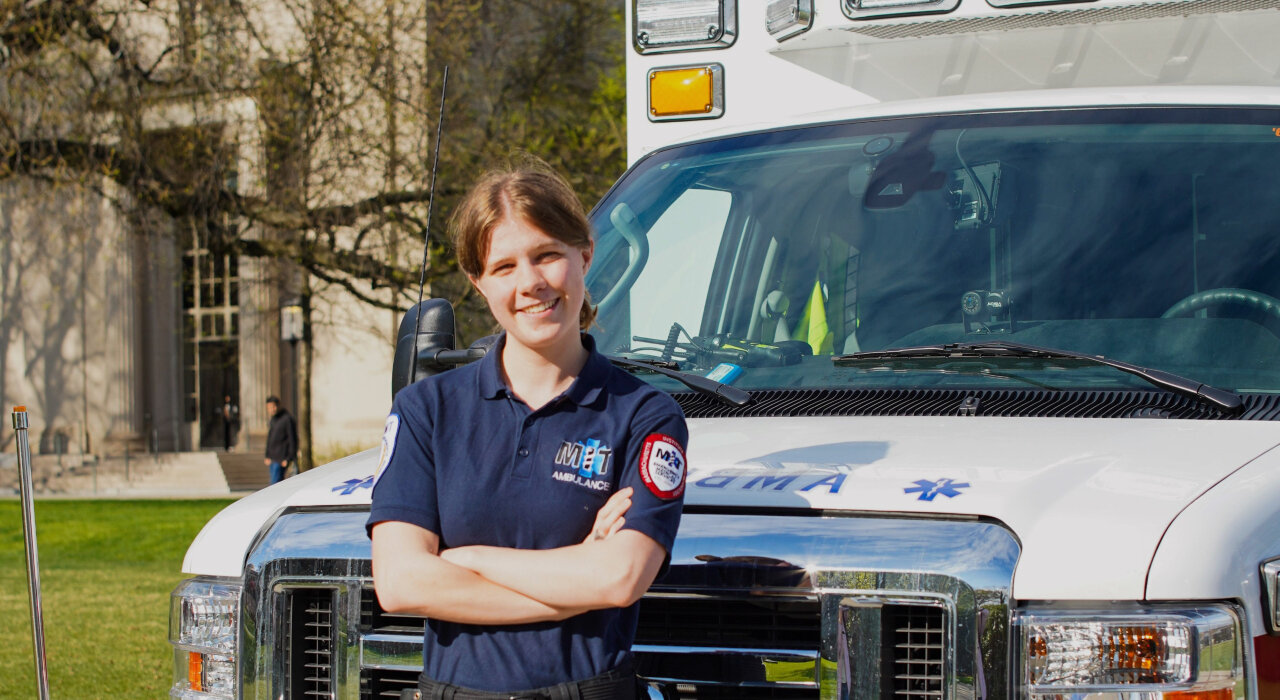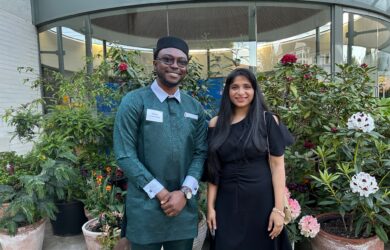
US Scholar-Elect Abbie Schipper talks about her work to improve medical equipment and how she trained as an Emergency Medical Technician during Covid.
“I spent so many of my college nights scooping people off the streets. Hospitals and the healthcare system can be scary and confusing. Emergency workers can make that a lot better.”
Abbie Schipper
Abbie Schipper’s work is focused on problem-solving. She always wanted to be a doctor and to make a difference to people’s lives, but studying medicine was not enough. She wants to improve the medical equipment doctors use, particularly in low-resource settings.
This is in part driven by her hands-on experience of being an Emergency Medical Technician (EMT) during Covid, her research at MIT on biomedical devices for low- and middle-income countries, and also by her work as a social entrepreneur.
Abbie, who begins her MPhil in Engineering in the autumn, set up the LifeSaveHer initiative after working as a cardiopulmonary resuscitation (CPR) instructor alongside her ambulance work. She found that people kept asking her about whether CPR, a lifesaving intervention for those in cardiac arrest, works on women given the manikins used for training and the video actors were male.
She looked at the data and found that women are about a third less likely to get CPR in public and are therefore less likely to survive an out-of-hospital cardiac arrest. Part of the reason is that people think CPR is more likely to hurt women and involves exposing their upper body. So Abbie set about creating low-cost female manikins for CPR. The initiative is still going and the team is researching the effectiveness of using female manikins in CPR classes. One paper recently published by the team shows that the female manikins make CPR trainees more confident about doing CPR on women.
Childhood
Abbie was born in Portland, Oregon, and spent most of her childhood there. Her mother is a music teacher and pianist and her father is a lung surgeon. Her brother went into music and Abbie into medicine. She says seeing what her father did, how he helped people and his role in the community had an impact on her as she grew up. “I began to understand what it meant to be a doctor and a good member of the community,” she says.
Nevertheless, her mother ensured both her children learned piano and sang in the choir, but Abbie found she really enjoyed singing and the sense of community in the choir. By the end of high school, she had been in five choirs.
Abbie describes herself as ‘a bit of a nerd’ at school. She took part in various sports when she was at secondary school, but quit to join the science team. She took the hardest classes she could and leaned into science and maths. She knew she wanted to be a doctor and when she got to the end of high school she took the pre-med path.
Because she knew she could do any course she wanted to before she went to medical school she opted for Engineering at MIT, once again because she was interested in giving herself a challenge. Initially, she was focused on Biological Engineering and Neuroscience, but she soon switched to Mechanical Engineering, drawn by its focus on problem-solving.
Emergency Medical Technician
In part, this was due to her experiences during Covid. Her course began in 2020 and her first semester was online because of Covid. Abbie wanted to do something practical to help so she took part in an intensive bootcamp to train to be an EMT, a medical professional who provides emergency care and transportation for patients. She learned the practical hands-on skills in just three weeks and sat a national exam.
She then began volunteering on ambulances, initially as what is called a third rider – a more observational post. Over the last few years, she has worked her way up to first rider in charge of the ambulance and passing on her own knowledge. During the pandemic her work involved transporting patients, both COVID positive and not, to the hospital. Emergency calls briefly fell in this period as people wanted to stay out of hospital, but those who did call were often more acutely ill, as they put off getting help earlier.
Abbie found the job rewarding and says it highlighted systemic failings in the healthcare system. She says: “I spent so many of my college nights scooping people off the streets. People call 911 on the worst days of their lives. If you can make those days better in any way that is very rewarding. Hospitals and the healthcare system can be scary and confusing. Emergency workers can make that a lot better.”
Mechanical engineering
Abbie did the emergency work alongside her degree. At MIT, she became involved in a series of Mechanical Engineering competitions. In 2021 her team won the American Solar Challenge which involved building a solar-powered vehicle and racing it across the country from Missouri to Nevada. Abbie was designated safety leader, meaning she was responsible for the health and wellbeing of 20 people. As a large swath of the team fell ill during their travels, Abbie says the experience cemented her desire to study medicine to keep the communities around her healthy.
In 2022, she started doing research in Professor Giovanni Traverso’s Laboratory for Translational Engineering and gravitated towards working on biomedical devices, particularly in low resource settings, building on her experience in emergency medicine.
She worked, for instance, on a Gates Foundation-funded project on biocompatible drug delivery implants for contraceptive drug delivery in sub-Saharan Africa. Another capstone project she helped to design and build was a ventilator which ran on air rather than batteries and could be used in places with limited surgical capacity. “It was a simple robust device that took a lot of engineering,” she says.
Abbie’s problem-solving skills were honed through her work on LifeSaveHer. With start-up funding, she was able to ship her female CPR manikins across the US to the organisations LifeSaveHer works with, which are mainly colleges. Abbie is currently wrapping up her work on the LifeSaveHer project, but will remain as an adviser and mentor.
Women and tech
In summer 2024 Abbie became involved with MIT’s Women and Technology Programme and worked as a residential tutor to teach female high school students the basics of engineering. Later the same year she went to Denmark on an internship programme to learn about space architecture, in particular researching the devices that might be needed in extreme environments. She worked, for instance, on building an underwater research habitat for astronaut training and oceanographic research. She is now back in Boston working on a critical care ambulance which operates as a mobile intensive care unit.
At Cambridge Abbie is interested in studying healthcare systems engineering, focusing on pre-hospital trauma systems in low- and middle-income countries [LMICs]. Her supervisor will be Dr Tom Bashford who is an expert in this area. She says so many medical devices get donated to LMICs, but are unusable in those settings. She wants to make better, more effective devices that truly work for local healthcare workers. Her plan is to go to medical school and she wants to be sure she has the toolbox she needs to work in emergency medicine around the world.












